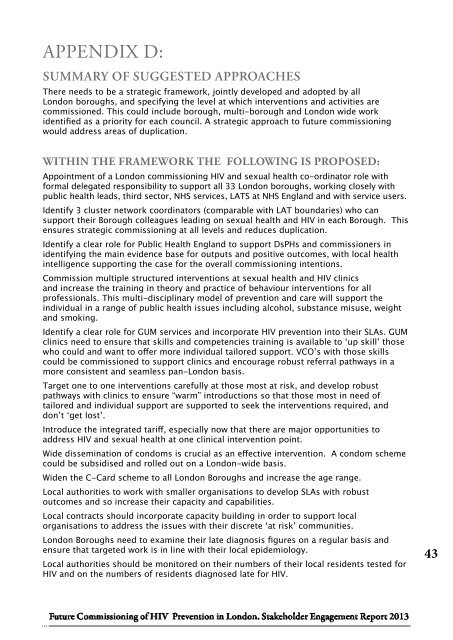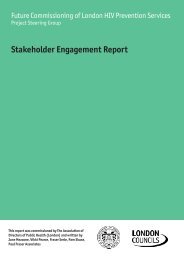Stakeholder Engagement Report - London Councils
Stakeholder Engagement Report - London Councils
Stakeholder Engagement Report - London Councils
Create successful ePaper yourself
Turn your PDF publications into a flip-book with our unique Google optimized e-Paper software.
Appendix D:<br />
Summary of suggested approaches<br />
There needs to be a strategic framework, jointly developed and adopted by all<br />
<strong>London</strong> boroughs, and specifying the level at which interventions and activities are<br />
commissioned. This could include borough, multi-borough and <strong>London</strong> wide work<br />
identified as a priority for each council. A strategic approach to future commissioning<br />
would address areas of duplication.<br />
Within the framework the following is proposed:<br />
Appointment of a <strong>London</strong> commissioning HIV and sexual health co-ordinator role with<br />
formal delegated responsibility to support all 33 <strong>London</strong> boroughs, working closely with<br />
public health leads, third sector, NHS services, LATS at NHS England and with service users.<br />
Identify 3 cluster network coordinators (comparable with LAT boundaries) who can<br />
support their Borough colleagues leading on sexual health and HIV in each Borough. This<br />
ensures strategic commissioning at all levels and reduces duplication.<br />
Identify a clear role for Public Health England to support DsPHs and commissioners in<br />
identifying the main evidence base for outputs and positive outcomes, with local health<br />
intelligence supporting the case for the overall commissioning intentions.<br />
Commission multiple structured interventions at sexual health and HIV clinics<br />
and increase the training in theory and practice of behaviour interventions for all<br />
professionals. This multi-disciplinary model of prevention and care will support the<br />
individual in a range of public health issues including alcohol, substance misuse, weight<br />
and smoking.<br />
Identify a clear role for GUM services and incorporate HIV prevention into their SLAs. GUM<br />
clinics need to ensure that skills and competencies training is available to ‘up skill’ those<br />
who could and want to offer more individual tailored support. VCO’s with those skills<br />
could be commissioned to support clinics and encourage robust referral pathways in a<br />
more consistent and seamless pan-<strong>London</strong> basis.<br />
Target one to one interventions carefully at those most at risk, and develop robust<br />
pathways with clinics to ensure “warm” introductions so that those most in need of<br />
tailored and individual support are supported to seek the interventions required, and<br />
don’t ‘get lost’.<br />
Introduce the integrated tariff, especially now that there are major opportunities to<br />
address HIV and sexual health at one clinical intervention point.<br />
Wide dissemination of condoms is crucial as an effective intervention. A condom scheme<br />
could be subsidised and rolled out on a <strong>London</strong>-wide basis.<br />
Widen the C-Card scheme to all <strong>London</strong> Boroughs and increase the age range.<br />
Local authorities to work with smaller organisations to develop SLAs with robust<br />
outcomes and so increase their capacity and capabilities.<br />
Local contracts should incorporate capacity building in order to support local<br />
organisations to address the issues with their discrete ‘at risk’ communities.<br />
<strong>London</strong> Boroughs need to examine their late diagnosis figures on a regular basis and<br />
ensure that targeted work is in line with their local epidemiology.<br />
Local authorities should be monitored on their numbers of their local residents tested for<br />
HIV and on the numbers of residents diagnosed late for HIV.<br />
43




